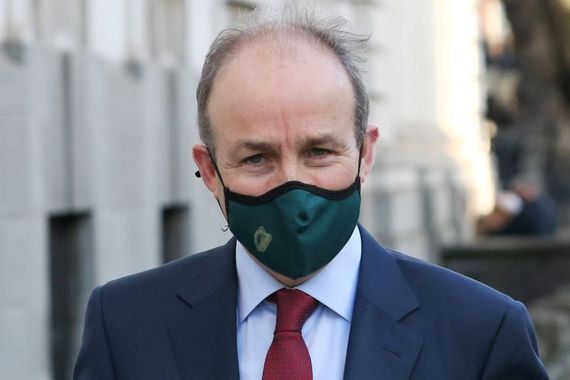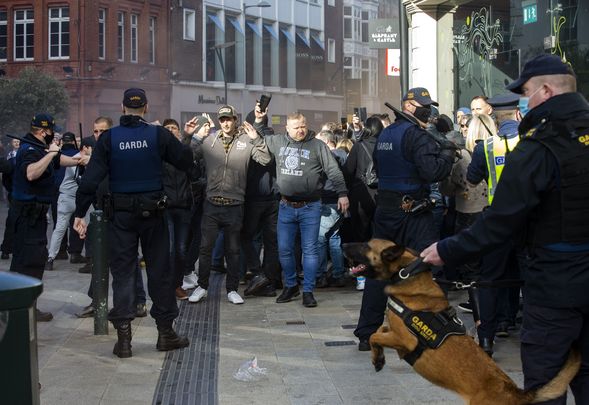Things are improving but not fast enough and we have to stay in lockdown until April 5, the Taoiseach said.
Hospital COVID admissions are down. Our ICUs are coping. But new case numbers were averaging around 700 a day over the past week and seemed to be stuck there. That is far too high to relax restrictions, according to the experts who say we need to get below 100 before we can start opening up again.
Progress is being made. The 14-day incidence rate here which was the worst in Europe in January is now down to around 20th.
But the big fear is the ease of transmission of the Kent variant from the U.K. which is now the dominant one here. If we open up too quickly it could spread so fast we would be facing another crisis in weeks.
Read more
So the government is playing safe by extending the lockdown until we can get the vaccine rollout ramped up. And it is the failure on that front that is depressing so many people here.
The figures speak for themselves. By last weekend the U.K. had given first jabs to 20 million people. Here in Ireland by Thursday of last week, we had done 270,000. In Northern Ireland, with a population of one-third of the south, they had done half a million.
It's not all our fault, of course, since we are tied into the centralized EU system for vaccine supply which has been hopelessly slow. In fact, we are doing better than some of the bigger EU countries, like France.
But that is little consolation to people here when they look at our nearest neighbor. And it does not give much confidence in the vaccine promises made by Taoiseach Micheal Martin last week.

Taoiseach Micheal Martin.
Martin said that the plan was to be doing 250,000 jabs a week by April and that by the end of June around 80 percent of people here will have been given at least one jab. The arrival of an effective single-shot vaccination like the Johnson & Johnson one could enable faster progress -- but although it's now approved in the U.S., the EU says it will take them another few weeks to do so (no surprise there!)
An Irish Times poll last week revealed that over 50 percent of people here don't have confidence in the government's management of the virus. The same poll showed a huge fall in support for the coalition, with the taoiseach's party, Fianna Fail, down to a disastrous 14 percent. Of course, that could turn around quickly if the vaccine rollout is a success in the coming months and the economy opens up again before summer is over.
At the moment, however, confidence remains low and there is widespread frustration at the rate of progress. For many people and businesses, it is despair and anger rather than frustration with the lockdown extended into April. And there is no guarantee it will end even then.
None of this has been helped by the poor communication coming from the government and the lack of clear and speedy decision-making. An example is the almost farcical attempt to implement hotel quarantining for travelers arriving here without negative tests or from high-risk countries like Brazil and South Africa.
Around 70 percent of workers in the meat industry here are Brazilian because the job is hard and factories don't pay enough to attract Irish workers. Our English language schools attract many more foreigners since the students know they can vanish into our black economy (order a meal delivery here and the bike rider who wheels up to your door is often Brazilian).
All of which means we have a lot of people from Brazil and other high-risk countries (there are now 30 countries on our list) arriving here. Under current legislation, they are supposed to quarantine at home for two weeks when they get here, but there has been no effective enforcement. The garda can make house calls but so far they do not have the legal power to enter homes to make checks.
Mandatory hotel quarantine was called for months ago by experts here and was supposed to be introduced weeks ago but was delayed by concerns about legality. It took until last week for enabling legislation to be passed in the Dail.
It will be going to the Senate here for discussion this week and it could be several more weeks before hotel quarantining actually begins. The government's plan involves getting approved hotels to provide transport from the airport and the security as well as meals and accommodation, which sounds like more official buck-passing.
Last weekend the Sunday Independent revealed that over 2,000 people from Brazil had arrived in Ireland in a 28-day period in January and February. Many of these would have been returning meat plant workers who had been home for Christmas. It also revealed that since January over 200 new Irish work permits have been issued to people from Brazil, Nigeria, and South Africa, all hotspots with new variants -- yet another example of government departments failing to act together.
Over 2,000 people from Brazil had arrived in Ireland in a 28-day period in January and February.
It's all far from convincing and is an example of why so many people here are skeptical about our ability to do anything effectively or quickly enough. Much of this is the result of officials across government departments who have no concept of how to take emergency action and are more interested in covering their backsides in case something goes wrong and they get blamed. And their political masters are just as bad.
Much of this is due to our coalition government, based on a deal that has Martin as taoiseach until the end of 2022 when Leo Varadkar will take over again for the final two and a half years of the government's term. Varadkar and other Fine Gael ministers have been upstaging Martin every time they get the chance which is undermining the credibility of the administration. The messaging on Covid is confused rather than clear.
In an effort to stamp his authority on the situation, the taoiseach has been more visible recently and set out a definite timeline in his speech to the country last week. He said the plan was to get first jabs into 82 percent of people here by the end of June. Of them, 55-60 percent would be getting a second jab in the same time frame.
If that is achieved we would be in a completely different situation and we could start thinking about a phased reopening through July and August, ahead of the September target. That would help to preserve more of our decimated hospitality industry.
This is entirely dependent on the vaccine rollout and the government is now pinning all its hopes on that. They are terrified about starting a fourth wave of the virus if we ease up too quickly before we can get up to speed. That is why they have extended the lockdown until April 5.
And it's worth remembering that it's a full Level Five lockdown, with everyone who can working from home, a five-kilometer travel limit, all non-essential shops, bars, restaurants, etc. closed. The only chink of light is that some kids are being allowed back in school this week.
We will have a better picture of the situation at the end of April when the effect of this longer lockdown has worked through our society. By then, if all goes to plan, all the older people here and those with serious medical conditions that make them vulnerable to Covid will have been vaccinated.
At that point, there will be huge pressure to have outdoor dining, and drinking, perhaps even to have bars and restaurants open again with social distancing inside. There will be demands that the five-kilometer rule be scrapped and that all non-essential stores, including barber and beauty shops, should be allowed to open again.
The argument will be that even if the virus is still circulating those most at risk will be protected and the vast majority of younger people will be able to cope without hospital if they catch it. Whenever it ends -- and the end is coming -- the full extent of the economic damage here will be revealed. It will be horrendous, just as it will be in most other countries.
But the situation will be even worse here thanks to Brexit. This has not yet become apparent because it is being masked by the disruption caused by Covid. But it is there and will eventually emerge.
In one way we have been lucky. The huge multi-national tech and pharma companies here (mostly American) have been largely untouched by the pandemic, with even more demand for their products and social media services. That has protected many jobs and a lot of tax revenue here.
But it's a very different story in smaller domestic enterprises here, in the tourism and hospitality and other sectors which are so vital to our economy. Many of these businesses are now "temporarily" closed and their workers are living on the Pandemic Unemployment Payment from the state. When we eventually re-open a significant number of these businesses will stay closed and their workers will find themselves on ordinary unemployment benefits which is much lower.
In summary, there is light at the end of this very long tunnel. In spite of that, we had a mob of anti-vaxxers, Covid hoaxers, and freedom "patriots" in a violent protest in the center of Dublin last weekend.
These idiots can be ignored. But there is also widespread frustration here that we have been in strict lockdown for longer than most other European countries and don't seem to be in a better position than them.




Comments